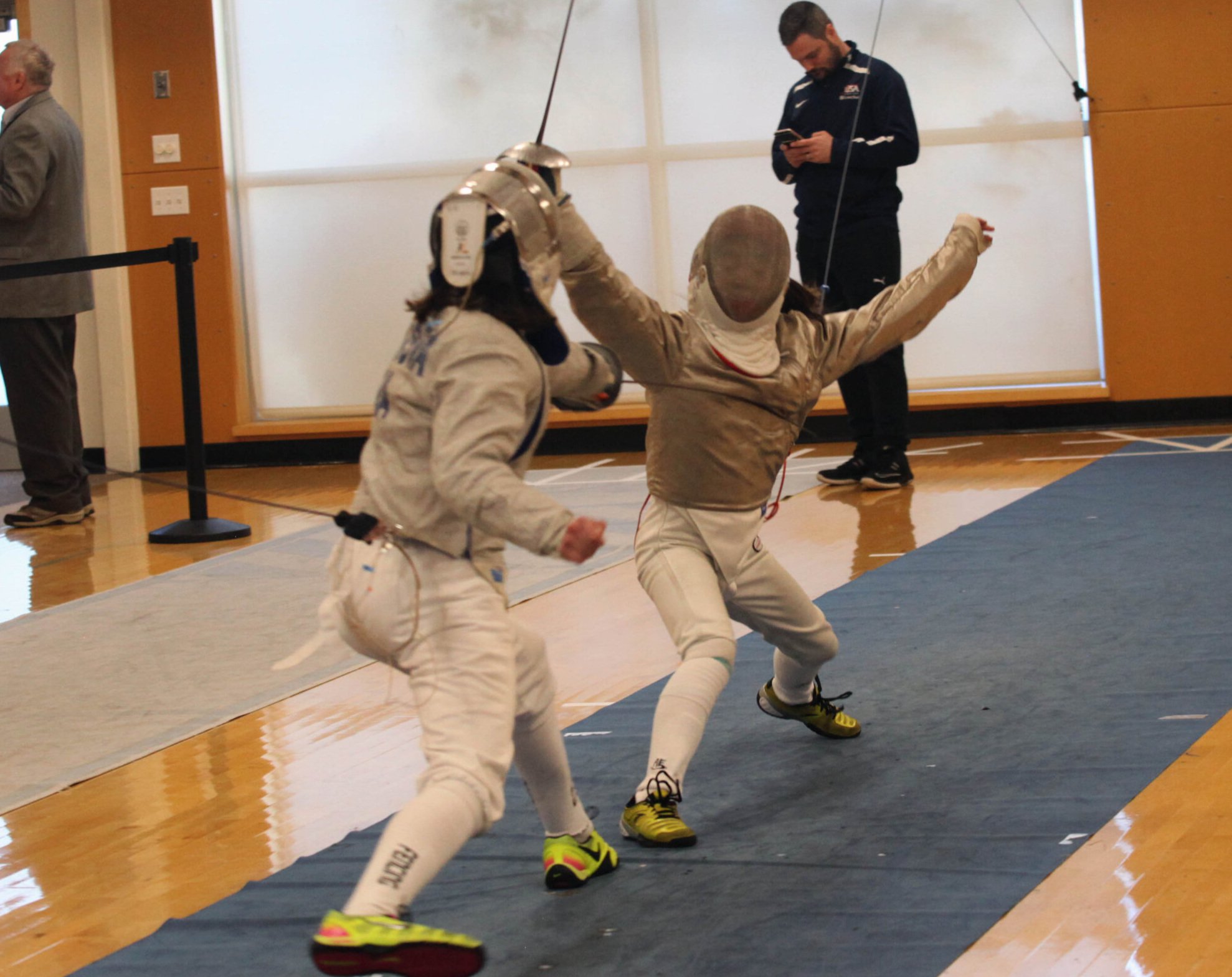
Preparing to Compete this Season
Things you MUST do in advance!
You MUST have a USA Fencing Membership
This is separate from your Monthly membership at WFA. You will need an Access Membership to compete at local tournament (the starting level for new competitors).
You will need a Competitive Membership if you plan to compete at the Regional Level or higher.
You can convert your Access Membership to a Competitive Membership at a future time if you need to.
You MUST have your own gear
You may not use rental gear to compete—it will not pass the gear check!
In most cases, we have the “whites” available for sale at the gym, as well as swords, body cords, extra blades and some electric masks.
If you need to order additional items from Absolute Fencing, please let us know no later than August 30. We will be putting in a group order. Please let us know the item number, size, handedness and gender if applicable, or sign up for a sizing session to get some help with your gear needs.
For the list of required gear, click HERE.
Sign up for an AskFred Profile
You will need a profile to sign up for local tournaments. If you have already competed at the local level, you already have a profile. AskFRED is the Fencing Results and Events Database. It is how you will sign up for local level tournaments, find results, and scope out training clinics if you so desire.
Click to go to AskFRED.
You will need to know your USA Fencing number, so have that handy. Additionally, you will need the following information when setting up your account:
Region: 1
Division: Western Washington
Country: Please put USA!
Things you are stongly encouraged to do in advance!
Find your Age Class Eligibility
In most cases, you will be eligible to compete in 2 or more events. Events are based on your birth year, and therefore roughly your age. If you are new to competing, start with the youngest event before trying to compete in an older age category. The older the age category, the more difficult the event will be. Talk to us before jumping into the next age category (or before moving up to a higher level tournament!)
You can check your eligibility HERE. If you have any questions about which event you should be signing up for, please talk to us!
Mark your Calendars!
The first LOCAL tournament will be held at Salle Auriol in Seattle. While the date has not been released yet, the first tournament is usually held towards the end of September or early October. You will sign up via AskFRED.
The first REGIONAL level tournament will be the September Portland RYC, held at Northwest Fencing Center in Portland the weekend of September 28th. If you have talked to us about competing at the regional level (i.e., you have already been competing at the local level and you are ready to move onto more difficult tournaments), then please put this in your calendar. Sign up via USA Fencing. Pricing increases after 9/7. (The first regional RJCC will be in October.)
The first NATIONAL level tournament will be the Cascade Clash SYC, held at Northwest Fencing Center in Portland the weekend of August 23rd. Sign up via USA Fencing. Pricing increases after 7/31.
If you are new to competing, you should ONLY be signing up for local events!
See Tournament Schedule HERE. It will be updated as tournaments are posted.
Understand the Different TYPES of competition
Competitions come at different level of difficulties. We term these “Local,” “Regional,” and “National.”
Local Tournaments are the starting level of competition outside of the WFA classes. Most of these are held in Seattle or near Portland, OR.
Regional Tournaments are where competitors fight for ranking within our 5-state region, so the competition is more difficult. Tournaments include RYC, RJCC, and ROC events.
National Tournaments are where competitors fight for ranking within the entirety of the USA. It is where you will find the highest ranked fighters in the US competing. Tournaments include SYC, SJCC, and NAC tournaments, as well as the National Championships and the Junior Olympics.
ABBREVIATIONS
RYC: Regional Youth Circuit (REGIONAL)
SYC: Super Youth Circuit (NATIONAL)
RJCC: Regional Junior and Cadet Circuit (REGIONAL)
SJCC: Super Junior and Cadet Circuit (NATIONAL)
ROC: Regional Open Circuit (REGIONAL)
NAC: North American Cup (NATIONAL)
JO: Junior Olympics (NATIONAL)
Nats/JC: National Championships and July Challenge (NATIONAL)
Train and Prepare for Competition
Plan to attend open fencing. Not just once or twice before a tournament. Make open fencing a regular part of your training. Classes are where you learn new techniques and tactics; Open fencing is where you learn to apply them. Going to class and then to a tournament is equivalent to shooting hoops at home to practice your shots, and then skipping team practice or scrimmages and just showing up for a game. There is no amount of class time or private lesson time that can prepare you to compete the way that Open Fencing will.
Consider Private Lessons. As you start competing, there may be specific things that you and/or your coaches need to or want to work on. Private Lessons are immeasurably valuable!
More Good Things to Know…
Consider the Competitive Membership at WFA
To make your life easier, the WFA has a Competitive Membership that includes:
Monthly Membership
Unlimited Classes
Strip Coaching at Local Events
Contact Angie if you are interested in switching over to a Competitive Membership.
Strip Coaching
Strip coaching is when a coach accompanies a competitor to a tournament and provides advice during the actual bouts. (A student will generally have anywhere from 3-12 bouts per event.) This is incredibly important for successful competition. Often, in the moment, the competitor is unable to see why they are not getting points or are unable to take advantage of mistakes their opponent is making. The strip coach, watching from the outside, can see these things and guide the student during a match.
For more info on Strip Coaching, visit our Strip Coaching Page
Know your Role!
The coach’s job is to coach, the student’s job is to compete, and the parent’s job is to cheer.
When your student is being coached by the coach, please let the coach do their job. It can be confusing for students to be given contradictory advice by coaches, fellow students, and parents.
There will be times that the coach cannot be there to strip coach. They may be working with a student on another strip, or two students from the WFA may be competing against each other (in this case, neither student will receive strip coaching from the coach.) This is where fellow students and parents can step in and help coach.
We suggest taking a look at this great article about parent strip-coaching: “Strip Coaching A parent's guide to coaching your fencer at a tournament” by Coach Toby Lee
https://www.tacomafencing.com/documents/FencingStripCoaching2018_0617.pdf
How Parents can Help:
A good night’s sleep is essential for a good performance, so don’t let your child stay up late the night before a tournament. Sleep deprivation is cumulative, so your child should get at least 8 hours of sleep in the days preceding the tournament.
What your child eats and drinks: The night before a tournament, a meal with carbohydrates and lean protein, such as pasta with chicken, will prepare your child’s body. The morning of a tournament, breakfast should include another protein (eggs are good) for an additional boost. Avoid fatty foods (such as donuts) which can slow your child down. Hydration is also vital to an athlete’s success, so be sure your child drinks plenty of water the night before the tournament, and during the tournament as well.
Cheer your student on! Congratulate them after a match on what they did well. We can’t win every match, but we can use every match to improve and identify what we need to work on.
Additional Resources
WFA Website
Gear
Tournament Schedule
Intro to Competition
Point System: Understanding Regional and National rankings and how to qualify for the Championships.
Additional Sites of Interest
Absolute Fencing (Gear)
The Fencing Post (Gear)
Blue Gauntlet (Gear)
Leon Paul USA (Gear)
Great Fencing Scenes
More Great Fencing Movies
USA Fencing YouTube Channel - watch live during national competitions!
FIE Fencing YouTube Channel - watch live during international competitions!
